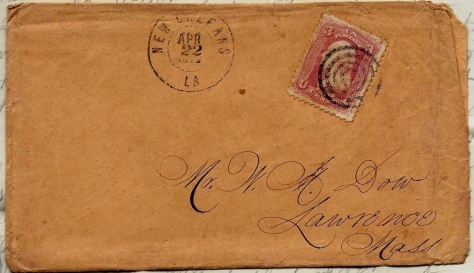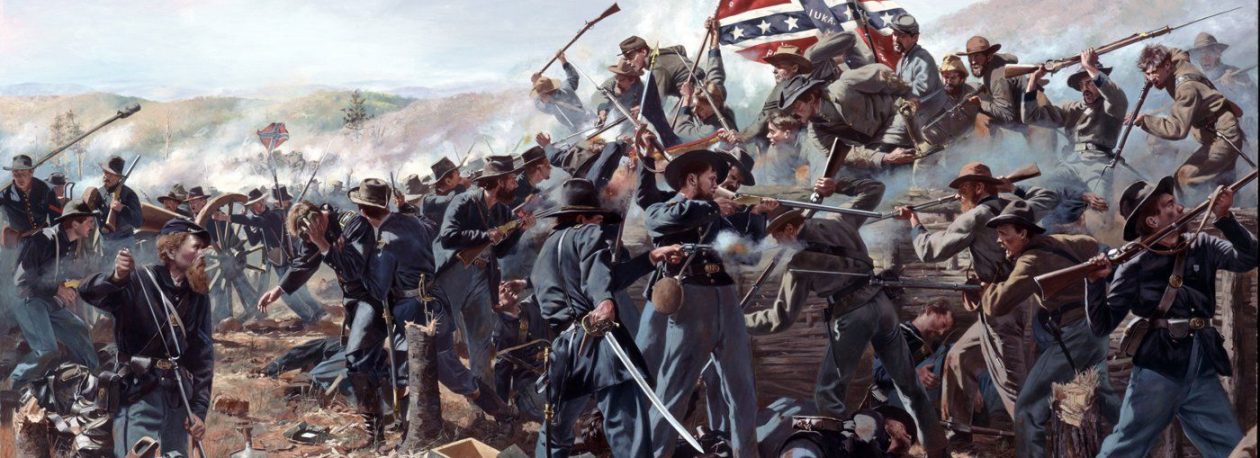This letter was written by Wesley W. Dow (1841-1863), the son of William Montgomery Dow (1815-1866) and Mary Jane Goodale (1819-1897) of Lawrence, Essex county, Massachusetts.
Wesley enlisted in Co. B, 41st Massachusetts Volunteers on 9 August 1863. In June 1863, the 41st regiment was transferred from an infantry unit to a cavalry unit, becoming the nucleus of the 3rd Massachusetts Cavalry. Wesley was not long in the saddle, however. He died of chronic diarrhea on 11 August 1863 at the regimental hospital in New Orleans, Louisiana.
Wesley’s brother, Albert F. Dow, is mentioned several times in the letter. Albert was a 2nd Lt. in Co. B. 4th Massachusetts Infantry—a nine-months unit.

TRANSCRIPTION
Addressed to Mr. W. M. Dow, Lawrence, Massachusetts
Postmarked New Orleans, La.
Brashear, Louisiana
April 16th 1863
Dear Father and Mother,
I received from you, Father, No. 6 last Saturday just after going on board the boat bound for a trip up the Atchafalaya and over the waters of Lake Shestimaiah to attack the Rebels at Franklin. I also received a note from Mother in one of Emma’s letters written on my birthday. Would you believe it when I tell you that my birthday passed and I was hardly aware of the fact. If you recollect, you will know the reason why. The 4th Regiment came up from Carrollton to Baton Rouge that morning and I had enough to do to talk up old times with Albert and the rest of the boys without thinking of my birthday. I did not even give it a mention in my journal. Probably this is the first time since I came to the “Years of Understanding” that I have not thought more or less on that subject.
I informed you of what I did with your letter which I got on board the boat in Emma’s letter. When I wrote her, I understood, and it was the general understanding that the 4th was to remain here. But that same night after we went out into the stream, they were ordered to pack up and before morning they were 9 miles on the road. They have driven the Rebels from Franklin and the 4th are now returning. About 100 of them came down on the Laurel Hill and the rest are coming [and] will probably be here tomorrow. The rest of the army is in pursuit of the Rebels so I don’t know when or where I shall find them. But Albert will give you a more detailed account than I can & I will leave him to the task. You will see by Ella’s letter in which I wrote this A.M. why I am here. I shall return by the first boat to the regiment or by the next boat after Albert gets back.
We left here at about 9 o’clock on the morning of Sunday and when within 9 miles of our destination, we got aground. The flag boat tried to pull us off but was unable to do it and left us to wait until they could come back with assistance or get off the best way we could. By means of two flatboats which we had towed along containing wagons &c., and the ship’s boats, they landed all of us and after working all night, they finally put a hawser on shore and let the men take hold and off came the vessel. She soon came alongside and we got on board and arrived at our landing place about noon when I— feeling so weak from the effects of the diarrhea that I felt unfit to keep up with them—I told the Capt. so and he told me to fall out and come on as fast as could convenient. But the regiment had hardly started when the surgeon came along and said, “Stay here a few moments Wesley,” and soon the hospital warden came along and took 5 of us on board the Laurel Hill—and here we are at Brashear.
I hear that 2 or 3 of the 41st are wounded and also that none are wounded. Which report is true, I don’t know. Ed had to stay and go up with the horses so he was not in the fight. He went up Tuesday.
While we were ashore when the boat was aground, we were on a small piece of land perhaps half an acre where they were engaged in the manufacture of [barrel] staves. Back two rods from the river, it was nothing but a mud hole, full of underbrush &c. &c. That night I slept in the house and my bed was made of staves which formed a much more comfortable bed than the ship afforded for they intended to land us before night and they crowded us on like sheep in a pen. You couldn’t get a comfortable place to sit much less to lie down.
Father, you just mention that you think of sending my $100 to Uncle A. to pay for the oxen. All right, but seems to me as though you don’t confide your schemes to me. For the life of me, I cannot tell whether you have raised the house 1 foot 18 inches or 2 feet. Which is it?
How is it about paying for the church now that S. B. W. Davis has failed? Have you got a cellar under the kitchen? What do you get per day [working] in the mill now? And how much was your pay raised? You wrote some about it but I have sent the letter home, I believe, by French or else it is in New Orleans with the rest of the stuff. Hasn’t French delivered that package of old letters yet? Hasn’t any water come into the cellar yet?
Give my respects to that young lady that sent her respects to me by you as well as the rest of my friends in Lawrence. Since I have been in Brashear, I have been stopping with Johnnie Gillman, he being on the sick list when the regiment left. He has the diarrhea but not bad. But enough for today.
Your affectionate son, — Wesley
P. S. I guess that you will find the last 3 letters rather mixed but I thought when I wrote one that I would leave this or that piece of information until I wrote to you or somebody else and I have got things rather muddled. Who lives upstairs now? How is Mr. Sear & Giers? I guess that you as well as I will be glad when I get where I can use a pen. Hastily, — Wesley
Brashier
April 18th 1863
Dear Parents,
I expected before this to have rejoined my company but the 4th did not get back until yesterday A. M. and I thought I would stop a little longer and it was perhaps lucky for me that I did—at least I am not sorry that I stopped.
This morning seeing the Laurel Hill coming down the river, I thought that I would go to the landing and see what she brought down. Almost the first thing that I saw was Orderly [James A.] Morse and Sergt. [Joseph F.] Glidden. They soon informed me that the whole company were on the other side of the river and would soon be over. This rather surprised me but on their mentioning that they were mounted, I remembered that the boat was loaded with long-eared animals and I found that my suspicions were rather strong that they had been foraging on a large scale.
They brought down about 700 (seven hundred) mules and horses and some very fine mules too, I found upon observation, and many good horses though small. So that not going up, I have been enabled to rejoin them and I might have missed them had I gone up.
My diarrhea is completely cured and I feel tip top again thanks to—not the hospital but Albert’s careful attention and supply of delicacies after his return. But the mosquitoes are falling terrible in love with me and so I think that I had better beat a hasty retreat. Give me New England and her anti-mosquito producing soil. At least it is such for a large part of the year and this is the reverse.
But good night. You may not hear from me for 2 or 3 weeks and you may hear from me regularly. I hear that the army has come to a stand and that all their baggage is to be forwarded. What it can mean, I don’t know. Don’t see why they should halt there. Good night.
Albert sent a long letter this morning. — W







Hello I’m a relative of the Dow family. Do you know where Wesley is buried?
LikeLike
I did not attempt to research that aspect.
LikeLike
Oh my. You say he died at hospital. Did you find the obituary?
I love the letters btw thank you for posting..
LikeLike
He must of gotten malaria from the mosquito bites ? Says his diarrhea went away. Well I’m no expert in the disease
LikeLike